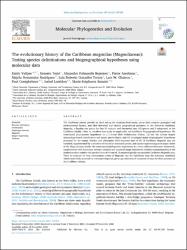/admin/item?itemID=d4fc8de8-c0cc-41dc-b944-c324d8df6d1e
The evolutionary history of the Caribbean magnolias (Magnoliaceae) : testing species delimitations and biogeographical hypotheses using molecular data

View/
Type of Access
OpenMaterial Type
ArticleType of Content
Scientific researchSubject
Biodiversidad - República DominicanaFlora ─ República Dominicana
Hábitats y especies
Especies amenazadas
Language
EnglishCollection
- Investigación ambiental [1743]
Metadata
Show full item record| Abstract: | The Caribbean islands provide an ideal setting for studying biodiversity, given their complex geological and environmental history, and their historical and current geographical proximity to the American mainland. Magnolia, a flagship tree genus that has 15 endemic and threatened taxa (12 species and 3 subspecies) on the Caribbean islands, offers an excellent case study to empirically test Caribbean biogeographical hypotheses. We constructed phylogenetic hypotheses to: (1) reveal their evolutionary history, (2) test the current largely morphology-based classification and assess species limits, and (3) investigate major biogeographic hypotheses proposed for the region. |
| Author(s): | Veltjen, Emily
Testé, Ernesto Palmarola Bejerano, Alejandro Asselman, Pieter Rodríguez, Majela Hernández González Torres, Luis Roberto Chatrou, Lars W. Goetghebeur, Paul Larridon, Isabel Samain, Marie-Stéphanie |
| Date: | 2022 |
| Published: | Molecular Phylogenetics and Evolution, 167, 107359 |
| Citation: | Veltjen, E., Testé, E., Bejerano, A. P., Asselman, P., Rodríguez, M. H., Torres, L. R. G., ... & Samain, M. S. (2022). The evolutionary history of the Caribbean magnolias (Magnoliaceae): testing species delimitations and biogeographical hypotheses using molecular data. Molecular Phylogenetics and Evolution, 167, 107359. Recuperado de: |
| URI: | https://bvearmb.do/handle/123456789/2275
|

